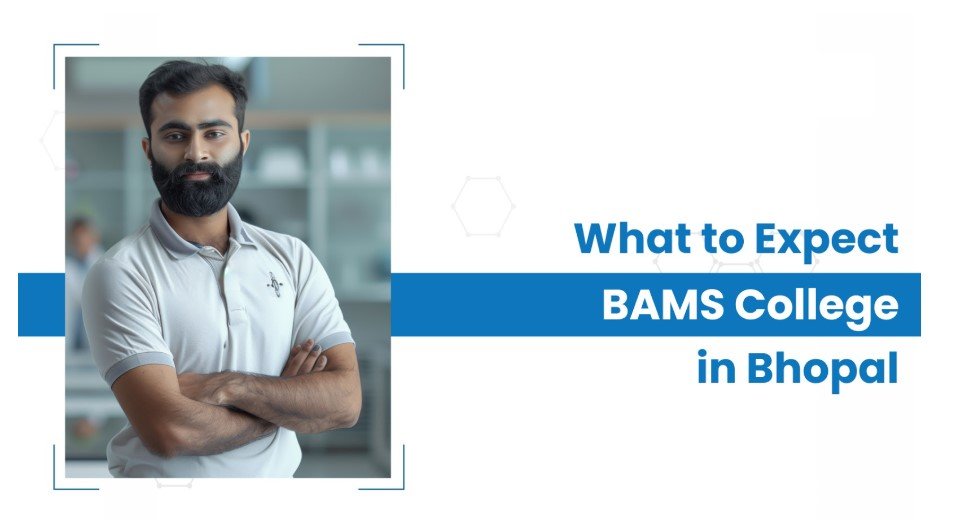You don’t just decide to take a medical degree for Ayurveda; it’s a way into a philosophy that heals the body, quiets the mind, and understands the harmonious nature cycle. Similarly, the Central India Bhopal is the ultimate choice to pursue BAMS. Why? Because the city offers academic earnestness with a profound cultural bond to Ayurvedic healing, providing students with an environment that feels modern but rooted.
Go to a good BAMS college in Bhopal, and you will sense it: the sense of purpose, the smell of herbs wafting from labs, the lines of patients in teaching hospitals, and the chats where Sanskrit verses and modern pathology come together.
It’s not all about books and exams. It’s about embodying science, learning to mix herbal formulations, feeling the pulse, learning therapies like Panchakarma, and uncovering the awesome depth of Indian medical wisdom.
This guide here reveals what exactly it means to study BAMS in Bhopal. From what is driving the city’s increasing need for distinctive teaching, clinical exposure, and culture at top colleges, this is the inside view of a journey that is intellectually gratifying and personally transformative.
Why Bhopal is a Preferred City for BAMS Studies
If you are choosing where to study BAMS (Bachelor of Ayurvedic Medicine and Surgery), Bhopal often tops the list, and for good reasons. It’s not just a college town; it’s where culture, education, and healthcare infrastructure intersect beautifully.
Educational environment
- Diverse student body: You’ll meet peers from across India, all drawn by Bhopal’s reputation in Ayurveda. This diversity enriches discussions and peer learning.
- Cultural vibrancy: The city brims with classical music, festivals, and a respect for holistic living. That incense-scented classroom influence isn’t staged—it’s part of the daily vibe.
- Competitive edge: Bhopal’s major players—both public and private BAMS colleges push academic rigor. Regular quizzes, mock patient rounds, and hands-on workshops sharpen students early.
- Affordable living: Tuition and accommodations are much gentler on the wallet than in metro cities, letting you focus on studies and clinics instead of rent stress.
This dynamic mix of academic challenge and cultural richness gives Bhopal a magnetic appeal for Ayurveda aspirants.
Medical infrastructure
You don’t just learn theory, you apply it, in real hospital corridors.
- On-campus hospitals: Many colleges have their own Ayurveda hospitals. Between outpatient and inpatient services, you’ll clock in thousands of patient-facing hours.
- Multi-disciplinary collaboration: Bhopal is home to modern hospitals and Ayurveda centers, leading to joint clinics. You might assist in an orthopedic patient’s joint care that blends an Ayurvedic diet with physiotherapy.
- Specialized centers: Research wings, Panchakarma suites, and emergency wards enhance clinical training beyond what’s available in many other cities.
- Government support: Frequent government health outreach programs and AYUSH-sponsored camps provide real-world exposure to rural healthcare challenges.
All these factors position Bhopal as a practical, supportive, and enriching environment for BAMS students.
What BAMS Colleges in Bhopal Typically Offer?
So what’s the daily rhythm like? What makes student life in a BAMS college in Bhopal so memorable and effective?
Course structure and practical modules
BAMS spans five-and-a-half years: four years of academics and a one-year internship. It’s rigorous, but structured to build both foundational knowledge and real skill. Here’s a breakdown:
- First Two Years (Pre-clinical & Para-clinical)
- Subjects: anatomy, physiology, biochemistry, Sanskrit
- Practicals: dissection labs, physiology experiments
- Key skills: understanding human biology through dual lenses—modern science and Ayurvedic texts
- Next Two Years (Clinical)
- Main subjects: Kayachikitsa (medicine), Shalya (surgery), Shalakya (ENT/eye), Stri-Roga (women’s health), Kaumarbhritya (pediatrics)
- Training modules include Panchakarma theory, herbal pharmacognosy, and hospital rounds.
- Weekly clinics: managing cases in OPDs under senior supervision.
- Internship Year
- Rotational postings in Ayurvedic OPDs, Panchakarma suites, emergency labs, and public camps.
- Experience in handling real patients, compiling case records, and performing treatments.
- Some colleges give rotations in modern hospital settings, great for integrated practice readiness.
The aim? To graduate you as a confident, evidence-informed Ayurvedic physician, not someone who’s only rote-learned text.
Role of hospital exposure
Observation is good. Participation is better. Bhopal’s BAMS colleges ensure you step in, not stand aside.
- Daily OPDs: Treat the full range of cases from migraines and joint pain to complex lifestyle disorders like metabolic syndrome.
- Inpatient wards: Manage Panchakarma patients, monitor vital signs, and oversee diet and therapy regimes.
- Emergency room exposure: Handle acute cases like injuries or food poisoning, blending Ayurvedic regimens with urgent care systems.
- Health camps: Regular outreach in villages, schools, and slums—where you do checkups, educate on herbal diets, and provide basic therapies.
This immersive approach makes the shift from student to healer gradual and grounded. You’ll come out battle-tested, not bewildered.
Career Paths for BAMS Graduates in Bhopal
When that final internship PDF hits your inbox, what doors swing open? Let’s explore your options in Bhopal and beyond.
Public sector jobs
Joining government service is a popular and respected path.
- AYUSH medical officer: Work in public health centers, rural dispensaries, or wellness wings of state hospitals. The pay and benefits—especially in MP—are stable and promising.
- Research positions: Government research institutes often recruit BAMS doctors for clinical studies, pharmacovigilance, and herbal standardization projects.
- Teaching roles: BAMS graduates with MD or diploma qualifications can become lecturers, training the next generation in institutions like Bhopal’s own Sri Sai Institute of Ayurvedic Research & Medicine, Bhopal.
- Public health programs: NGOs and government health schemes need doctors who can bridge traditional and modern medicine, for primary healthcare and prevention campaigns.
These roles offer job security, a structured paycheck, and community-level impact.
Opportunities for research or clinics
If entrepreneurship or science appeals, Bhopal has plenty of scope.
- Private practice: With in-clinic OPD, Panchakarma suite, and herbal dispensary, you can establish a sustainable setup. Senior alumni report healthy earnings within the first year.
- Wellness clinics and retreats: The city supports integrated therapy centers combining yoga, diet consults, and specialized Ayurvedic healing for long-term care.
- Collaborative research: Universities and health startups may recruit you for projects on Ayurvedic treatments for chronic diseases, particularly with funding linked to CCRAS or the National AYUSH Mission.
- Product development: Herbal formulations, dietary supplements, and topical applications. If you’ve got an entrepreneurial spark, this is your lab-to-market runway.
Graduates of Sri Sai Institute of Ayurvedic Research & Medicine, Bhopal have launched clinics offering Ayurveda + yoga services or joined herbal product startups—and found both meaning and financial gains.
Summing Up…
A BAMS college in Bhopal isn’t just a place to memorize ancient verses. It’s a dynamic education ecosystem, rich in cross-disciplinary clinics, deep cultural roots, and genuine patient care. You don’t just graduate with a BAMS degree; you graduate as a holistic physician who knows how to read a pulse, counsel a patient, write a research case, and even launch a clinic.
Choosing Bhopal. Whether a well-established institution or a specialized center like Sri Sai Institute of Ayurvedic Research & Medicine, Bhopal—means choosing education with substance. You learn, you live, and you leave equipped to heal.




